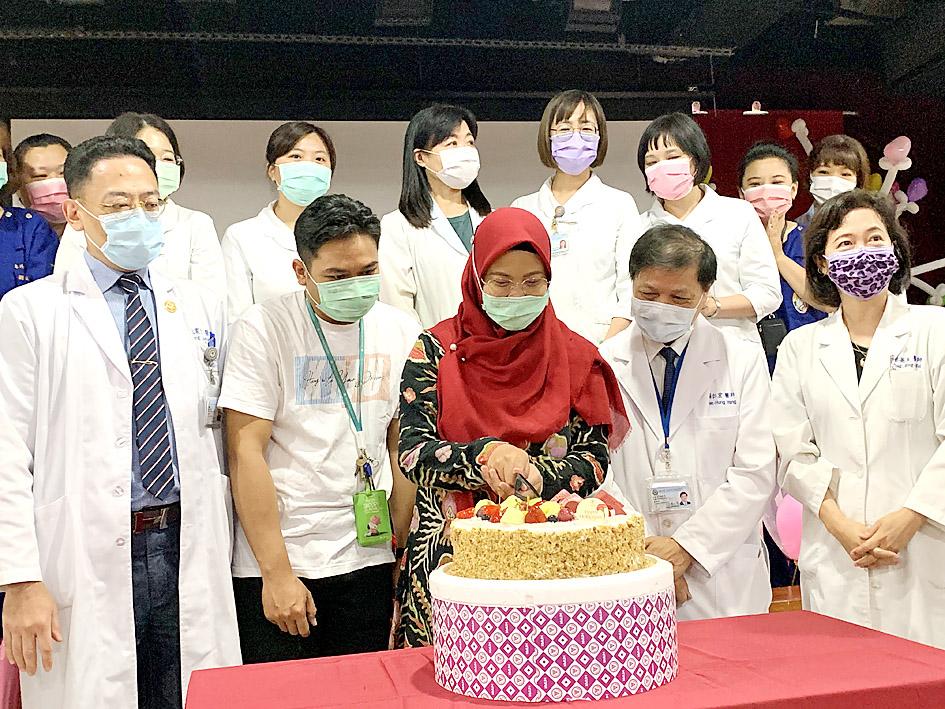The Executive Yuan yesterday unveiled a NT$9.1 billion (US$325.1 million) package of subsidies for parental leave, prenatal screenings and in vitro fertilization (IVF) procedures in a bid to boost the nation’s birthrate.
The parts of the proposal that do not require legislative consent are to be implemented from July 1, Executive Yuan spokesman and Minister Without Portfolio Lo Ping-cheng (羅秉成) told a news conference in Taipei after a regular Cabinet meeting.
Amendments to the Employment Insurance Act (就業保險法) and other regulations would increase the allowance for parental leave from 60 percent of insured salary to 80 percent, he said.

Photo: Fang Chih-hsien, Taipei Times
The increased allowance, which is to cost NT$4.2 billion, would draw funding from sources other than the Labor Insurance Fund to avoid crowding out other benefits, he said.
Amendments to the Act of Gender Equality in Employment (性別工作平等法) would allow spouses to go on concurrent parental leaves with allowances for one to six months, and each household can avail of this leave twice, he said.
Other, shorter-term leaves for childcare would also be permitted under proposed changes, he said.
In addition, workers would be able to apply for unpaid parental leave regardless of the employment status of their spouse and without providing a reason for doing so, he said.
Workers would have to give employers advance notice before taking parental leave to facilitate staffing arrangements at the workplace, he said.
Eligibility for the government’s IVF subsidies would be broadened to include all married couples who cannot conceive if at least one of the spouses is Taiwanese and the woman is under 45 years of age, Ministry of Health and Welfare Deputy Minister Shih Chung-liang (石崇良) said.
Income restrictions were removed after the program reported that only 52 low and medium-income couples enrolled for IVF subsidies, which produced only seven births over the past six years, he said.
Higher-income households are to receive a subsidy of NT$100,000 for their first IVF procedure and NT$60,000 for each one after that, he said.
As before, low and medium-low income households are to receive a subsidy of up to NT$150,000 per procedure.
Households in which the wife is younger than 40 years old can claim subsidies for six IVF procedures per conception, while households in which the wife is aged 40 to 45 can claim three.
Officials estimate that the expanded subsidies would benefit between 23,000 and 28,000 households, and that the program would cost up to NT$3.2 billion.
Free prenatal screenings would be increased from 10 to 14 for each pregnancy, while coverage would be broadened to include screenings for gestational diabetes and anemia, and two ultrasound tests.
Subsidies for the screenings would also be raised to improve the health of pregnant women, reduce infant mortality rate and encourage people to go into obstetrics.
The revised prenatal screening subsidies should benefit about 160,000 households and cost about NT$1.25 billion.

The first two F-16V Bock 70 jets purchased from the US are expected to arrive in Taiwan around Double Ten National Day, which is on Oct. 10, a military source said yesterday. Of the 66 F-16V Block 70 jets purchased from the US, the first completed production in March, the source said, adding that since then three jets have been produced per month. Although there were reports of engine defects, the issue has been resolved, they said. After the jets arrive in Taiwan, they must first pass testing by the air force before they would officially become Taiwan’s property, they said. The air force

The Coast Guard Administration (CGA) yesterday said it had deployed patrol vessels to expel a China Coast Guard ship and a Chinese fishing boat near Pratas Island (Dongsha Island, 東沙群島) in the South China Sea. The China Coast Guard vessel was 28 nautical miles (52km) northeast of Pratas at 6:15am on Thursday, approaching the island’s restricted waters, which extend 24 nautical miles from its shoreline, the CGA’s Dongsha-Nansha Branch said in a statement. The Tainan, a 2,000-tonne cutter, was deployed by the CGA to shadow the Chinese ship, which left the area at 2:39pm on Friday, the statement said. At 6:31pm on Friday,

The Chinese People’s Liberation Army Navy’s (PLAN) third aircraft carrier, the Fujian, would pose a steep challenge to Taiwan’s ability to defend itself against a full-scale invasion, a defense expert said yesterday. Institute of National Defense and Security Research analyst Chieh Chung (揭仲) made the comment hours after the PLAN confirmed the carrier recently passed through the Taiwan Strait to conduct “scientific research tests and training missions” in the South China Sea. China has two carriers in operation — the Liaoning and the Shandong — with the Fujian undergoing sea trials. Although the PLAN needs time to train the Fujian’s air wing and

STRIKE: Some travel agencies in Taiwan said that they were aware of the situation in South Korea, and that group tours to the country were proceeding as planned A planned strike by airport personnel in South Korea has not affected group tours to the country from Taiwan, travel agencies said yesterday. They added that they were closely monitoring the situation. Personnel at 15 airports, including Seoul’s Incheon and Gimpo airports, are to go on strike. They announced at a news conference on Tuesday that the strike would begin on Friday next week and continue until the Mid-Autumn Festival next month. Some travel agencies in Taiwan, including Cola Tour, Lion Travel, SET Tour and ezTravel, said that they were aware of the situation in South Korea, and that group